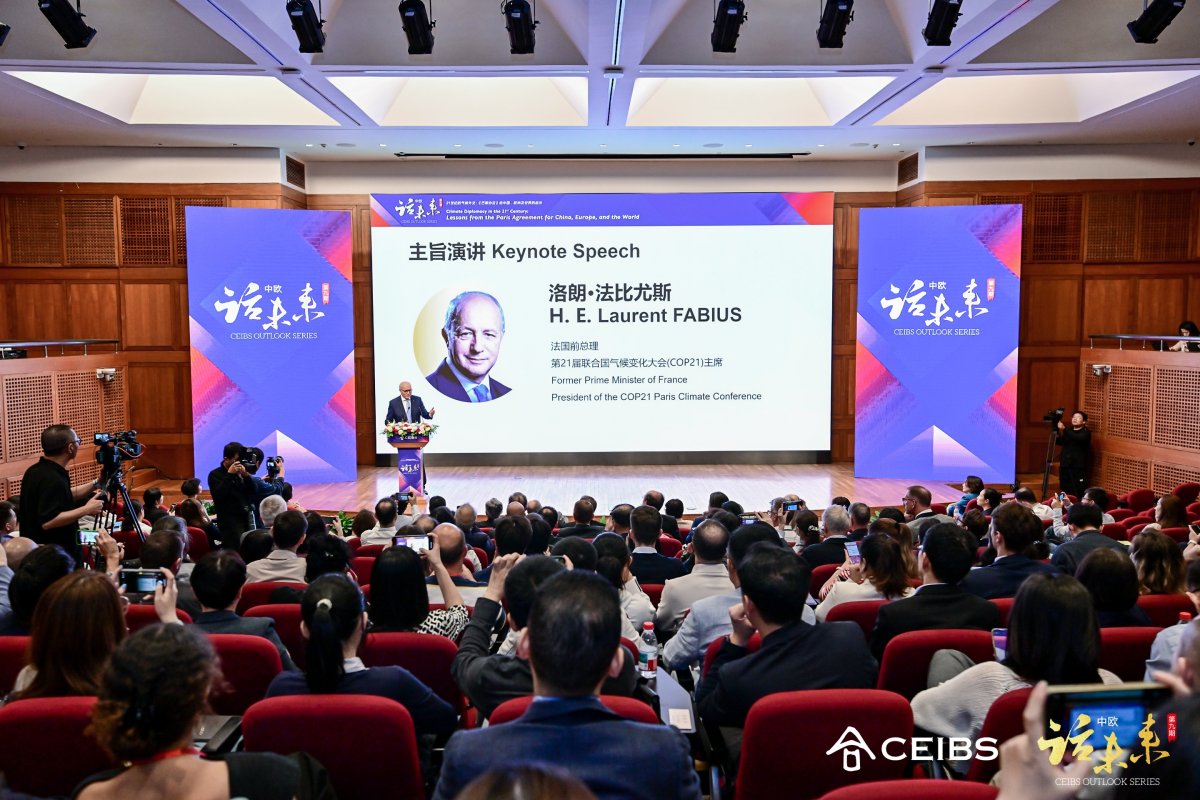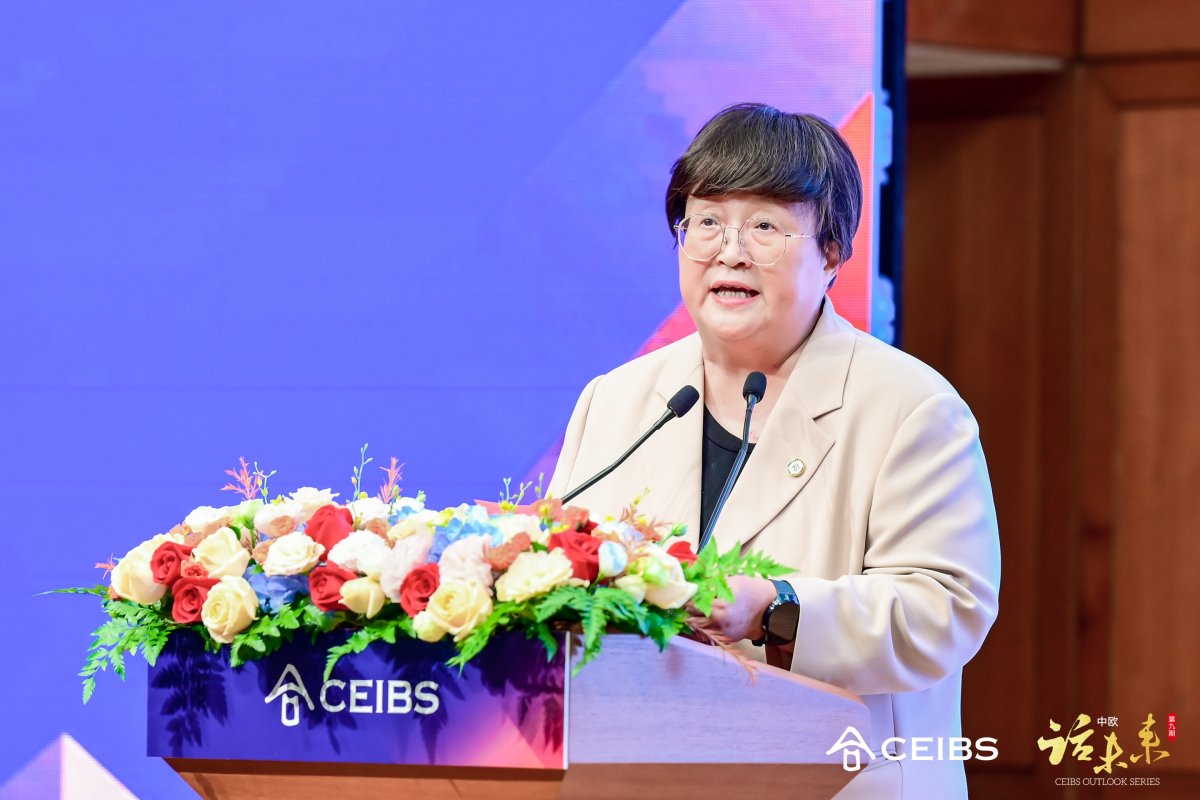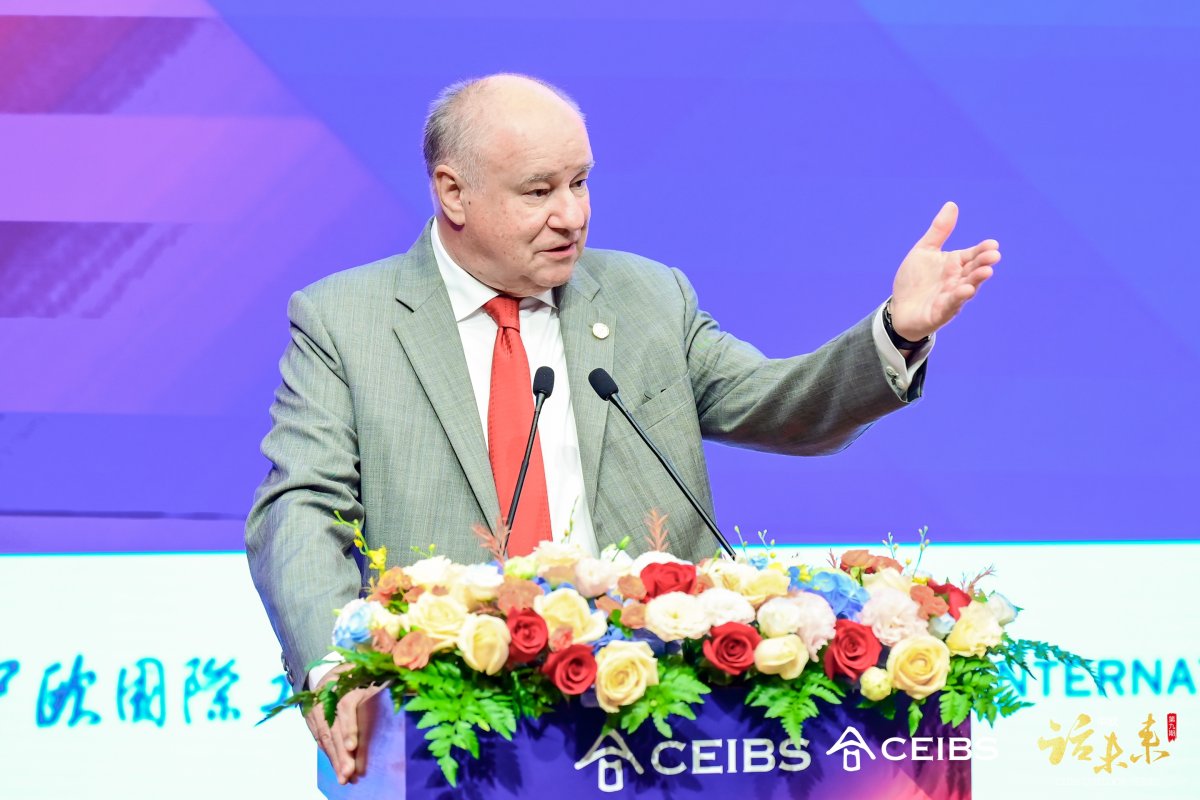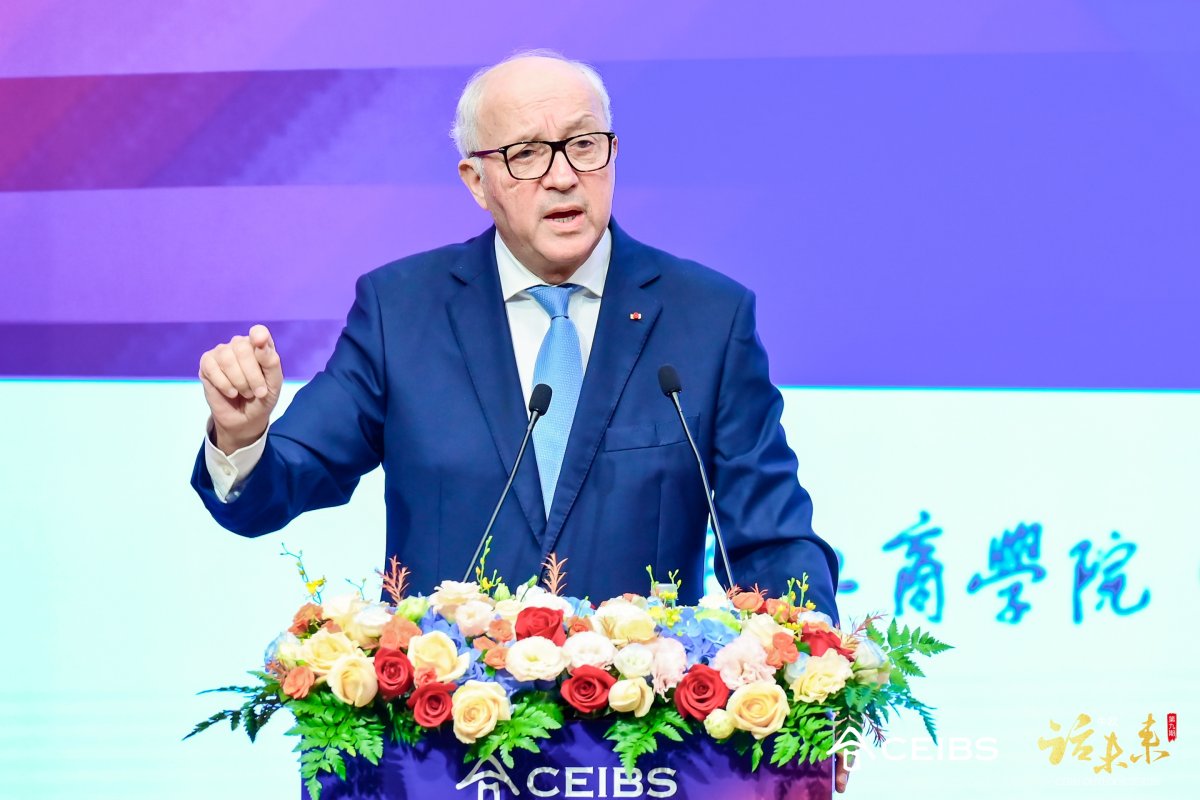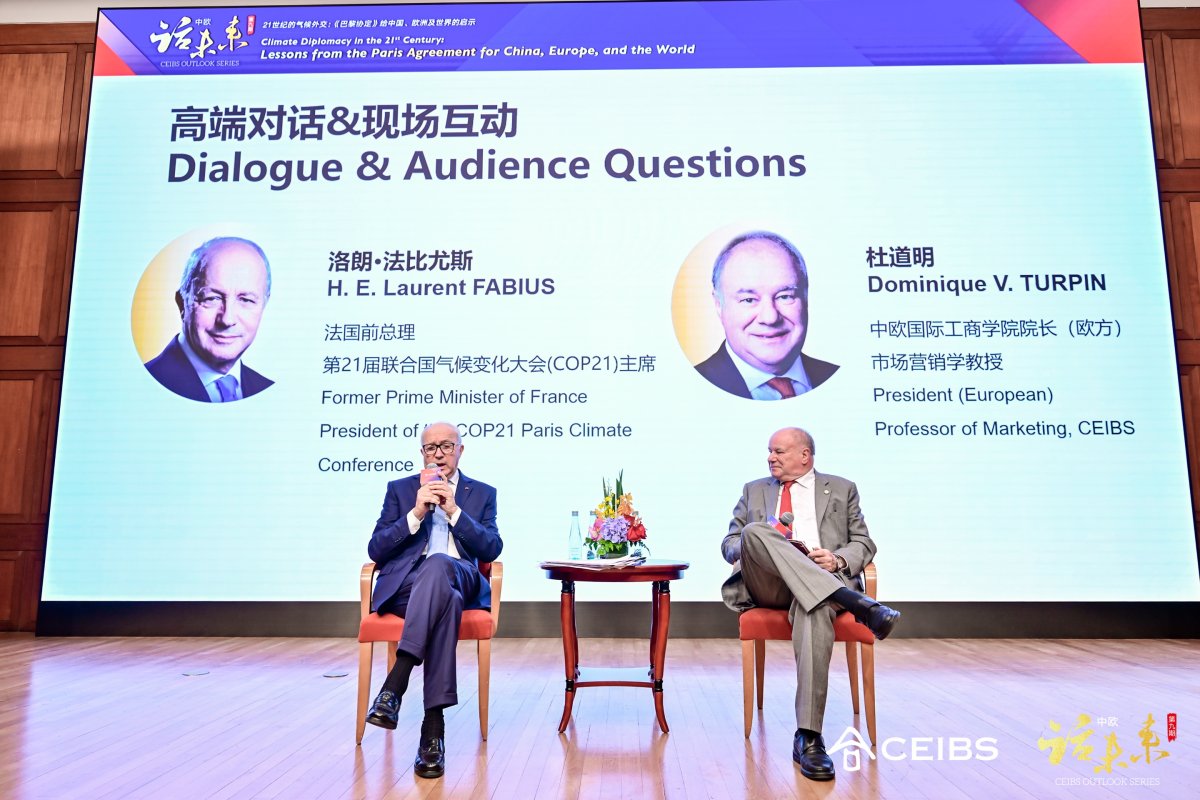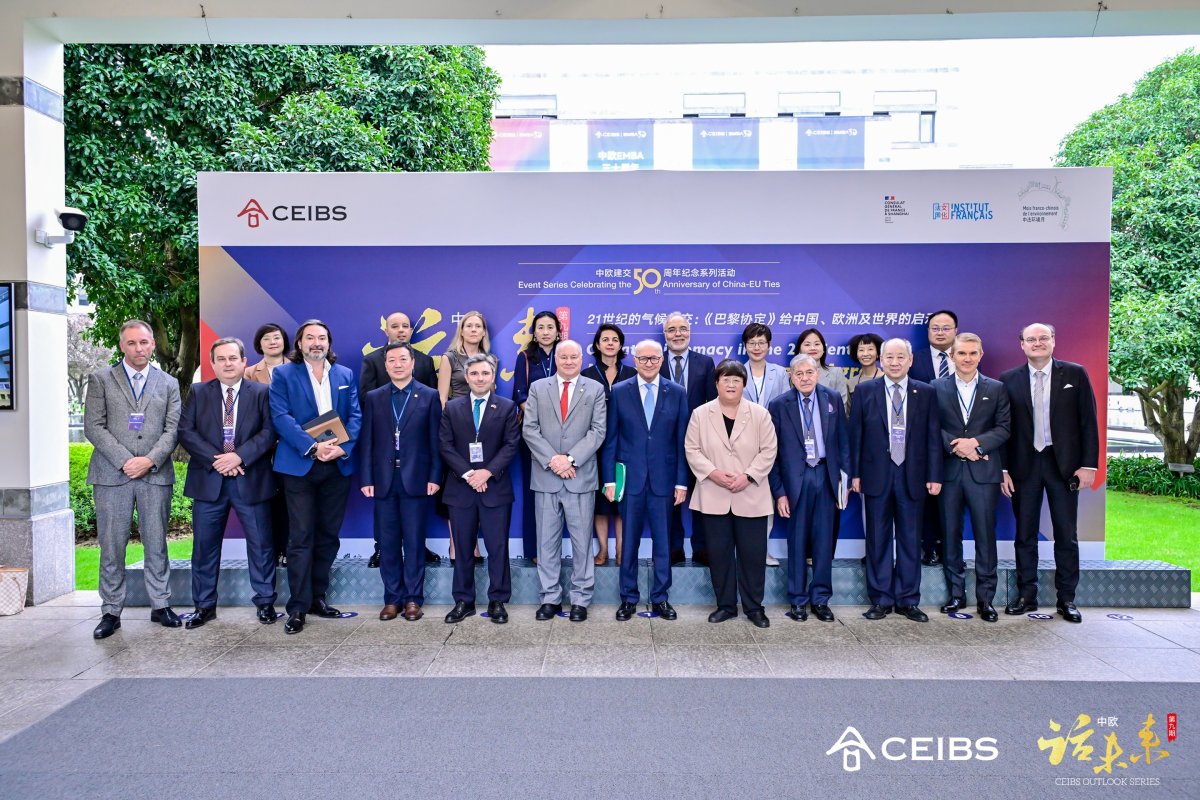CEIBS hosts former French PM Laurent Fabius for talk on “Climate Diplomacy in the 21st Century”
October 18, 2025. Shanghai - As the world marks the 10th anniversary of the landmark Paris Agreement, CEIBS today welcomed Laurent Fabius, former Prime Minister of France and President of the COP21 Paris Climate Conference—which directly resulted in the historic accord—for a keynote address entitled “Climate Diplomacy in the 21st Century: Lessons from the Paris Agreement for China, Europe, and the World.”
Held as part of the CEIBS Outlook Series at the school’s Shanghai Campus, the event was hosted by CEIBS President (European) Dominique Turpin and attended by European political dignitaries in China—including Consul General of France in Shanghai Joan Valadou, Consul General of Poland in Shanghai Adam Bralczyk, and Consul General of Portugal in Shanghai Silvia Inácio—as well as leaders of several multinational companies in China.
In a welcome address, CEIBS President Wang Hong began by noting that climate change, as a grave challenge faced by the entire global community, is already exerting a profound impact on the world economy, the international political order, and society as a whole. It is also, she added, one of the key areas in which cooperation between China and Europe holds the greatest potential.
President Wang asserted that the Paris Agreement established both an ambitious vision and a solid framework for addressing climate change, while also offering a paradigm for effective multilateralism. She further emphasised that both China and Europe have shown strategic commitment in the realm of climate governance, and should strengthen their cooperation, overcome their differences, and jointly lead the world’s low-carbon transformation. "I expect that in the future, China and Europe will reach further consensus in this field and pool our efforts to contribute more to pioneering a new era of global climate governance, writing a new chapter in the story of win-win cooperation between China and Europe,” she said.
Prof. Turpin then outlined Mr. Fabius’ long and storied career, noting his over four decades of ties with China as well as his relationship with CEIBS, which dates back to 2005 when he first visited the school to give a lecture to MBA students about EU-China relations. He also highlighted Mr. Fabius’ time as Prime Minister of France from 1984 to 1986, French Foreign Minister from 2012 to 2016, and later President of the French Constitutional Council from 2016 to 2025, along with his chairing of the 2015 United Nations Climate Change Conference, or COP21. The latter produced the landmark Paris Agreement, uniting nations in their commitment to confronting one of our planet’s most urgent threats.
“As an institution co-founded by the European Union and China, the marking of the 50th anniversary of diplomatic relations between the EU and China in 2025 carries profound significance for this year’s CEIBS Outlook Series and the school as a whole,” Prof. Turpin said. “In today’s climate, as globalisation faces headwinds while divisions and misunderstandings among countries continue to deepen, we believe such dialogue, grounded in reason, respect, and shared interests, is more valuable than ever.”
Speaking to an audience that included CEIBS faculty, alumni, and students, Mr. Fabius reflected on his experience as architect of the Paris Agreement and shared his insights into the ongoing global struggle to balance climate ambition with geopolitical realities.
Beginning with the reading of an open letter by the UN Secretary General António Guterres, Mr. Fabius asserted that climate change will profoundly affect society, the world economy, and geopolitical relations, with the main consequences and drivers of these changes including increasing frequency of natural disasters, rising sea levels, migration, extinction of species, and rising global poverty.
“According to statistics from the Intergovernmental Panel on Climate Change (IPCC), by 2050, one billion people living at altitudes below ten metres will be affected by climate change. The elevation of the ocean will further intensify, which will have an impact on the lives of these one billion people,” Mr. Fabius noted. “This may give rise to problems of malnutrition, infant mortality, lack of housing, lack of electricity supply, and lack of educational opportunities.”
Mr. Fabius further highlighted the fact that the Paris Agreement not only set a target for limiting the rise of global temperatures but also established the goal of achieving carbon neutrality in the second half of this century, underscoring the importance of the principle of Common but Differentiated Responsibilities (CBDR) in the Agreement given the different development levels of each country.
Offering his reflections on why the conference had succeeded in 2015, he summarised the key factors behind its success with what he called the “three S’s.”
The first S stands for Science; at the time of the conference, the scientific community played a crucial role in shaping understanding and building confidence around climate data and projections. The second S represents Society; societal actors including institutions, individuals, thought leaders, and the business community all helped steer the Agreement in the right direction. The third S refers to States, or national governments; ten years ago, major players including China, the United States, Europe, India, and Russia all demonstrated a willingness to cooperate on climate action. This political alignment and openness to collaboration, he emphasised, were indispensable to achieving the Paris Agreement.
While the success of COP21 could be attributed to the three S’s, Mr. Fabius highlighted that the upcoming COP30 conference in Brazil, to be held in November 2025, will hinge on what he described as the “three I’s”.
The first, Implementation, calls for moving from framework to concrete results, ensuring that national commitments translate into real progress. The second, Inclusion, urges broader participation from civil society, indigenous groups, parliaments, and international organisations, as well as stronger links between climate, biodiversity, and anti-deforestation agendas. The third, Innovation, underscores the growing role of legal and institutional tools—such as courts and international rulings—in advancing climate accountability. He added that China is playing an increasingly active role in this evolving landscape.
“Climate diplomacy is essential because of the nature of the challenge itself. Climate change is a shared global reality: international, interdisciplinary, and intergenerational. The choices we make today, or fail to make, will have lasting consequences for generations to come,” Mr. Fabius said. “We need to tackle climate change with multilateralism. We need it. And there is no possible multilateralism without a close link between China and Europe. Despite certain differences, both sides share fundamental interests, and it is crucial that they work together to advance multilateral efforts in tackling climate change.”
Following his address, Mr. Fabius joined Prof. Turpin in an engaging dialogue on the strategies and tactics that made the Paris Agreement possible, how to increase private companies’ participation in ESG-related initiatives, the role of artificial intelligence in combating climate change, and more.
The event concluded a series of forums held by CEIBS in 2025 to celebrate the 50th anniversary of diplomatic relations between the EU and China. It was held in collaboration with the Consulate General of France in Shanghai, which hosted a series of events as part of Franco-Chinese Environment Month, or Mois de l’Environnement Franco-Chinois (MFCE 2025), throughout October with the goal of raising awareness, spurring action, and strengthening bilateral cooperation in fields related to the environment. It also marked CEIBS’ ongoing efforts to deepen mutual understanding and collaboration between China, Europe, and the wider international community on issues of global concern.
The CEIBS Outlook Series is the school’s flagship platform to bring together some of the world’s most influential policymakers, thought leaders, and industry pioneers to engage in forward-looking dialogue on the pressing global issues of our time.







